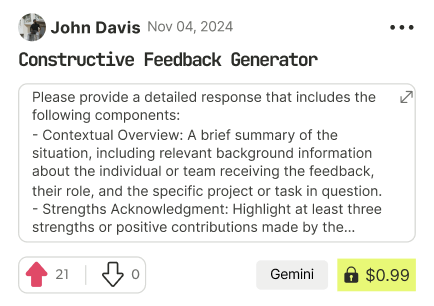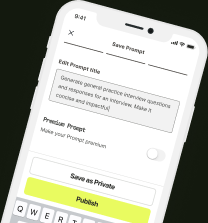prompt mine App
Find, Create & Share AI Magic
**Easing Back: Overcoming Post-Holiday Syndrome**
It's completely understandable to feel this way after a wonderful, extended holiday. Transitioning from that free-flowing, social time back to a structured work routine is a real challenge for your mind and body. Let's walk through this together and create a smooth path back.
Part 1: Symptom Identification
Based on what you've shared, here are the symptoms you're likely experiencing:
Physical level:
✓ Fatigue
✓ Sleep disorders (difficulty adjusting)
Psychological level:
✓ Anxiety
✓ Low mood
✓ Poor concentration
Behavioral level:
✓ Work procrastination
✓ Low efficiency
✓ Social withdrawal (craving quiet)
✓ Lack of motivation
Part 2: Root Cause Analysis
What you're feeling is a perfectly normal response, not a sign of weakness. Think of it as a form of jet lag, but for your lifestyle.
Circadian Rhythm Disruption: Your irregular sleep schedule has confused your body's internal clock. Going to bed at 2 AM and waking up at noon tells your body that this is the new normal. Now, forcing it back to an earlier schedule creates a conflict, leading directly to that feeling of being lethargic and having poor concentration.
Psychological Adaptation Lag: Your brain spent the holiday in a state of high stimulation and low pressure (fun, social events, entertainment). It adapted to receiving instant rewards. Switching back to the goal-oriented, delayed-gratification nature of work feels jarring and can trigger anxiety and a lack of motivation. The mental shift from "fun mode" to "productive mode" is the core of this challenge.
Social Battery Depletion: You've been "on" for a while—hosting, socializing, and engaging with others. Your social energy is simply depleted. The thought of returning to a role that requires significant team and client interaction is daunting because your system is signaling a deep need for quiet and recovery time. The core issue here is managing this energy deficit as you re-enter a demanding social environment.
Part 3: Phased Relief Strategy
Here is a step-by-step guide to ease you back in gently.
2-3 Days Before Return
Key Focus: Begin adjustment and gentle transition
Start adjusting your sleep schedule now. Aim to go to bed and wake up 30-60 minutes earlier each day to gradually align with your work schedule.
Taper down the high-stimulation activities. Swap a late-night gaming session for reading a book or listening to a relaxing podcast.
Re-engage your "planning brain" lightly. Spend just 20-30 minutes doing a simple organizational task, like tidying your home office or planning your meals for the first few workdays. This gently shifts your mindset.
Hydrate well and eat a nutrient-rich meal. Holiday food can be heavy, and rebalancing with lighter, healthier options can reduce physical sluggishness.
Last Day of Vacation
Key Focus: Schedule adjustment and mental preparation
Set your alarm for your regular work wake-up time. Getting up and getting some morning sunlight will be a powerful signal to your body clock.
Do a "pre-flight check" for work. Pack your bag, pick out your clothes, and make sure your laptop is charged. This removes small points of friction for tomorrow morning.
Spend 15 minutes reviewing your work calendar and to-do list for the week. The goal isn't to start working, but to mentally prepare for what's ahead, reducing Monday morning surprises.
Plan a calm, restorative evening. A warm bath, gentle stretching, or listening to calm music can help ease any pre-work anxiety. Avoid screens for the last hour before bed.
First Day Back at Work
Key Focus: Gentle start and pace control
Protect your calendar. If possible, avoid scheduling any high-stakes meetings or client calls on your first day. Block out time for focused work.
Focus on sorting and planning. Spend the first couple of hours organizing your inbox, prioritizing tasks for the week, and catching up on communications. This creates a sense of control.
Take a real lunch break. Step away from your desk, preferably getting outside for a short walk. This helps clear your head and breaks up the day.
End your day on time. Resist the urge to stay late to "catch up." A firm boundary on day one sets a sustainable pace for the rest of the week.
First Week Back
Key Focus: Progressive recovery and habit rebuilding
Tackle tasks strategically. Start with a few small, achievable tasks in the morning to build momentum before moving on to more complex projects.
Schedule "recharge" breaks. As a Project Manager, you have many meetings. Intentionally block 10-15 minute gaps between calls to step away, stretch, and be quiet. This is crucial for managing your social battery.
Re-establish a healthy routine. Focus on consistency in your sleep, meals, and a little bit of light exercise. Routine is comforting to the brain and helps restore your energy levels.
Acknowledge your progress. At the end of each day, take a moment to recognize what you accomplished. It doesn't have to be a huge amount; the goal is to rebuild your sense of productivity and confidence.
Part 4: Action Checklist
Here are the most important actions to focus on.
Must-Do Actions
Start adjusting your bedtime and wake-up time at least 2 nights before you return to work.
On your first day back, dedicate the morning to organizing emails and planning your week before diving into big tasks.
Proactively schedule short, quiet breaks (5-10 minutes) between meetings to manage social fatigue.
Recommended Actions
Review your work calendar for 15 minutes the evening before you return to mentally prepare.
Get at least 10 minutes of sunlight and a short walk in the morning on your first day back.
Plan a low-key, enjoyable activity for the evening of your first day back to decompress.
Avoid Actions
Avoid jumping into a major project or a difficult conversation on your first day.
Avoid staying up late the night before your return, even if you feel anxious.
Avoid skipping your lunch break or working late to "prove" you are back on track. This will only drain you faster.
Part 5: Supportive Message
Please remember to be kind to yourself through this process. It's completely natural to feel a sense of loss or anxiety when a wonderful period of rest and fun comes to an end. This transition doesn't happen overnight, and your body and mind need time to catch up.
You are not failing or being unproductive; you are simply recalibrating. Allow yourself the grace to move a little slower this week. You'll find your rhythm again soon.

**Easing Back: Overcoming Post-Holiday Syndrome**


Find Powerful AI Prompts
Discover, create, and customize prompts with different models, from ChatGPT to Gemini in seconds

Simple Yet Powerful
Start with an idea and use expert prompts to bring your vision to life!